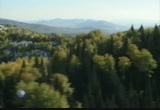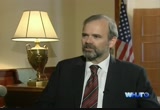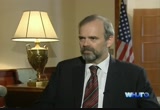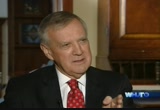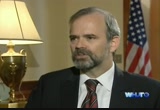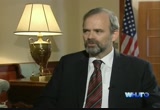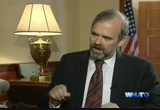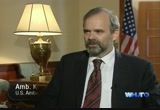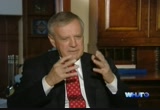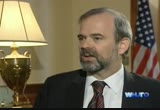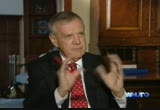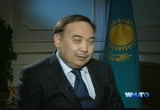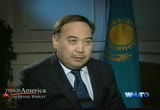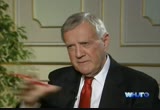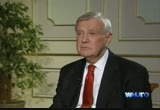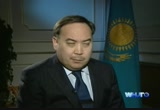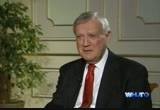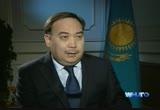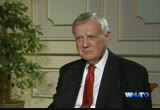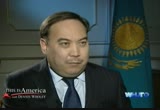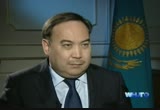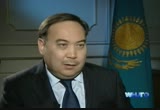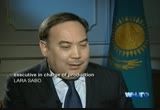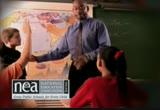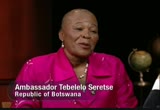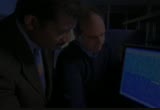tv This Is America With Dennis Wholey WHUT September 7, 2012 9:00am-9:30am EDT
9:00 am
>> recently "this is america" visited the republic of kazakhstan in central asia, one of the 15 countries formed by the breakup of the soviet union and is the most successful of the mall. on december 16, kazakhstan celebrates its 20th anniversary of independence. it is the ninth largest country in the world, and its location, oil and mineral wealth, and government vision, have all contributed to rapid growth. internationally, kazakhstan is a world leader in the goal of eradicated nuclear-weapons on earth. it is a beautiful country of snowcapped mountains, vast steppe regions and deserts' and both historic and futuristic cities. with a population of 16.5 million people, kazakhstan is
9:01 am
home to more than 100 different ethnic groups, resulting in an incredibly rich and diverse culture. over the next few programs, "this is america" will look at the culture, government, economy, and sides of kazakhstan. we'll also take a look at the importance of kazakhstan in the region, and it's a relationship which the united states. "this is america" visits of the republic of kazakhstan. "this is america" is made possible by -- the national education association, the nation's largest advocate for children and public education. poongsan corporation, forging a higher global standard.
9:02 am
the ctc foundation, afo communications, and the rotondaro family trust. later, i will talk with kazakhstan's foreign minister. right now, a visit with the u.s. ambassador to kazakhstan, kenneth fairfax. >> what should americans know about kazakhstan? >> i think the short answer is a lot more than they currently do. >> thank you. >> it is the ninth largest country on earth. it is a country that has a rather extraordinary relations with the united states, and yet most people really know either nothing or worse than nothing -- what they have seen in a movie, which is the opposite of reality, of course. there is a lot to learn. >> what are the mutual interests of the two countries, the united states and kazakhstan? >> we have many. you can look at it as an edgy,
9:03 am
food security. lots of overlapping interests. but what would come to most people first is non- proliferation and world security. kazakhstan, after the fall of the soviet union has -- became the fourth largest nuclear weapons state and the first one to decide we don't want it. the president declared they were going to be a non-nuclear weapon state and negotiated with the united states and russia to dismantle all of the weapons and then take what remained of them -- uranium and other components that remain dangerous -- and reduced those to a non-dangerous state. that was a really historic decision. in fact, it followed on an earlier one, which was 20 years ago he also closed the nuclear weapons testing site, the largest nuclear weapons testing site in the world. more than 450 explosions.
9:04 am
he actually did that before kazakhstan became independent. a decision saying, enough is enough. i hereby decreed that this place is closed. it has been closed ever since. >> one of the things you are saying -- and the history is fascinating, because just backing up a little bit -- kazakhstan was kind of like a state within the soviet union. so people can kind of grabs ahold of that. but he made a very -- the current president made a very, very bold statement to the world by saying this place is closed. >> he made a bold statement by saying the testing grounds is closed, made a net of one say no more nuclear weapons -- we have them, we don't want them. but then he did other things as well. for example, kazakhstan has always had a lot of oil, but it has been in the ground and not developed. really did not help the people
9:05 am
much at all during the soviet union. so, shortly after kazakhstan became independent, but there was an international calls saying, all right, let's work with the best international companies and develop the oil for the best of the country so you end up with american companies chevron coming in very early on to develop a large oil detail. that process of inviting in foreign investors was very early. this was a difficult, unsettled period around much of the former soviet union but kazakhstan stepped out and friends fast and said we will take a different route and be more open. >> in addition to the nuclear non-proliferation piece, we have a country that is not only vast inside -- as you mentioned -- but really oil-rich. >> it has the potential to become one of the 10 largest oil producers in the world. >> what do you make of the
9:06 am
people here, the culture? talk a little bit about that. i know this is a new posting for you. but you are experienced in this part of the world. >> the people are very interesting in gracious and very hard to pigeonhole. people will look at the region and say it is central asia. it is -- a geographic term, but culturally it is different. their culture goes all the way back to the days of the nomads. everybody has heard of getting this kind. this is part of the cultured -- everyone has heard of gengis khan. while no longer exists, it still unpacks the thinking. the nomadic culture. the family moves as a unit. there are heavy emphasis on relations and community. and all of it continues.
9:07 am
it gives a unique aspect. >> the country, is so vast, as you said. some of my reading said it is four times as big as texas and as big as western europe or something like that. it is kind of a tough neighborhood. there is a lot going on in this area. >> central asia has been a tough neighborhood for a long time -- since the breakup of the soviet union, it has been a tough neighborhood. even before that. there was a period where they're referred to the great game. it was not in kazakhstan, but the neighbors, and it was a tough neighborhood then. you can go back to 300 b.c. with the adventures of alexander the great, that this was a tough neighborhood even then. >> the sow for folks who are just watching our conversation, they may not have a map in front of them. just in your mind's eye
9:08 am
describes some of the countries in the area. the bordering countries, and so on and so forth. >> kazakhstan is a sort of this large country. it would look enormous were not for the fact that right next door is arrested to the north, the biggest thing on earth, and china to the east. you've got those two big ones. but within their, you got kazakhstan and around the edges you got kurdistan, whose pakistan -- uzbekistan and tajikistan and turkmentstan did essentially is a very then you move to afghanistan, pakistan, and from there on down to the subcontinent. >> for the folks at home as well -- but also to help my education -- when all of these countries were named stan, but that part has a reference? >> it is literally country.
9:09 am
just like stana is literally capital in kazakh. >> this is the 20 the anniversary of independence, and it is amazing that the culture has gone back 1000 years and then you jump forward and you say 50 years ago, part of the soviet union, and now 20 years ago, independence. how did you see the future of kazakhstan? >> kazakhstan is still writing its own future. nobody can predict where it is going. they made commitments -- last year you may know they were the head of the organization of security and cooperation in europe, and they made a long- term vision for a country that is very much a western country, i guess you would say, in the sort of democratic and human rights about you. that is not something that will happen overnight. so, over the next 5-10 years into the future, this country
9:10 am
will continue to remake itself. it has gone from a poor and impoverished -- impoverished country to a modern growing one and where it goes next is really up to the kazakh people. it is a constant process. the united states -- all countries change, but the pace of change here is really something different. independence to today in the same 200 years the united states took, and here it is only 20. >> i know this is a new posting for you. congratulations on being confirmed by the senate back home. what do you see as your mission? but my mission and every country and serve an is to really try to implement u.s. policy on a broad basis. in kazakhstan, we do have broad set of interest in relations that go from non-proliferation and nuclear issues, like that said, civilian uses of nuclear power. kazakhstan is now the world's largest exporter of uranium and
9:11 am
fifth largest exporter of grains and wheat, so the food security issue, which is really important in the world with all the drought. we have real -- military relationships with them, including relations that are now helping to supply our troops in afghanistan. regional issues, everything from trafficking in persons to drug trafficking. we simply cooperate on pretty much the whole range of issues that you would expect we would have with a major country, which kazakhstan is. it is really becoming so much more of our neighbor. the big one we are working on now is wto accession. kazakhstan has not yet become part of the world trading order, but they want to. they want to become an actor on the world stage that behaves by the same rules and works in the same way as everyone else does. this means our relations span everything. >> is there any competition between trying to get involved in the wto and the this, in
9:12 am
union that is happening between russia, belarus, kazakhstan? >> the short answer is, no, not really. there is a really complex answer. there is a way in which union agreements like that can be incorporated into wto. it is called a section 28 process where you modify people's agreements and go through it. but in the end, it will be more negotiating and more paperwork, but it is not incompatible. >> and it is all in the interest of trade. >> it is all in the interest of facilitating trade, so countries like isaac than it can export goods more freely around the world and other countries have the same rights and exporting to convict on -- kazakhstan. >> i am thrilled to have the opportunity to talk with you, mr. ambassador. >> thank you so much. >> after our conversation with ambassador fairfax, we visited the foreign ministry of kazakhstan.
9:13 am
what were you -- would you say are the pillars of the foreign- policy of kazakhstan? >> in up, after gaining independence in 1991, we became a full-fledged member of the united nations as a peace-loving nation. our foreign policy based on the purposes and principles of the united nations charter. in 1994 we joined as a non- nuclear state. and in 1995, together with the cooperation, extended from the united states, we managed to get rid of the nuclear arsenals that were being stored here in kazakhstan. the government put emphasis on economic development. we managed to attract over the period of 20 years investments of $150 billion.
9:14 am
what we are saying, what the message is being sent to the rest of the world -- instead of keeping nuclear weaponry and being a nuclear weapon state that is not playing a serious role in this environment, so by getting rid of the nuclear weaponry, we managed to completely reverse the trend of the country. and we managed to attract the economic potential of our country by attracting this large amount of investments from abroad. frankly speaking, in this region, in central asia, 80% of the investments coming to pakistan. the economic development was primarily aimed to upgrade the standards of the living of the
9:15 am
people. speaking about foreign policy, what i would like to emphasize, is the government and the president clearly understand this country cannot be prosperous having poor and frustrated neighbors along its borders. so, we are always extending a helping hand to our neighbors. we are telling them only integrated we can withstand and face the challenges that exist in this region. >> what kind of challenges are you facing? >> well, you know that one of the greatest challenges in this part of the world is afghanistan, which has continued to be a source of instability in the region. unfortunately the situation is not safe in this country. from the very beginning, we
9:16 am
supported the counter terrorist efforts of the international coalition and we joined the international coalition. we provided the air space for coalition forces. we provided our railroads and roads for transit. and we continue to cooperate with the international community to help afghanistan to become a stable state. afghanistan is our neighbor, and afghanistan sooner or later should become a peaceful, a piece that loving company with a stable society and developing economy. i think it is achievable. we are optimists. we know it is not easy. it might take years to achieve, but in any case, i think that what is important -- and i am
9:17 am
repeating again that much will depend on the joint efforts of all the countries in the region to help afghanistan's government and people to stabilize the situation in that country. >> tell me a local but about the importance of the relationship between kazakhstan and the united states. >> first, the ninth states -- as i said in my opening remarks -- the united states, as i said in my opening remarks, is the country that provided us great support to get rid of the nuclear weaponry. and the famous program -- cooperative threat reduction program -- worked well here in kazakhstan for many years. and, frankly speaking -- frankly saying, i could tell that this program was a real success kazakhstan. all missiles were dismantled. the warheads have been removed.
9:18 am
and the fuel -- the nuclear fuel has been transformed into peaceful purposes. a great achievement of many years of cooperation between the united states and cat extent. >> people might not know that when the soviet union controlled the area, it was in kazakhstan that they tested all of the nuclear weaponry, and this was kind of the headquarters. so, what the president did, even before independence, was to say, this must go. >> absolutely. it was a courageous decision made by the president at the beginning of independence. by his degree -- decree, decidedly" the testing site in the kazakhstan. and the size of this testing site, i tell you, quite
9:19 am
impressive. about 300,000 square kilometers, which is about roughly half of the size of france. there were about 500 nuclear explosions. 121 -- 120 of them in the atmosphere. and in 1991, it was closed for ever, and we had it just last week an important conference called the world free of nuclear weapons. dedicated to the 20th anniversary of the closure. which was attended by many delegates, including the general of the iaea and executive
9:20 am
secretary of the comprehensive nuclear test ban treaty organization. very impressive u.s. delegation, headed by the deputy secretary of energy and senator brownback and many others. so, that shows that kazakhstan played an important role 20 years ago by making this courageous decision. and is continuing to play and in poor enroll in the world. -- important role in the world. i can tell you during the cold war, around 1400 nuclear warheads were deployed in kazakhstan. and about 1200 intercontinental ballistic missiles. 95% of the nuclear warheads were targeted to the major cities of
9:21 am
continental united states. so, by getting rid of the weaponry and warheads, we are telling to our american partners that now they can sleep safer, without knowing that somewhere in the world their house is being targeted by the nuclear weaponry. so i think it was a serious and enormous contribution to the peace and security in the world. when we speak about kazakhstan, we had the fourth largest nuclear arsenal in the world. which was larger than the arsenal of the u.k., france, in china combined. and i think it says for itself. >> as the foreign minister, when you look at the world today, what do you see? >> well, it is -- there are a
9:22 am
lot of things happening right now in the world. since the beginning of this year, we have seen the event in north africa and the middle east. there are many problems related to the economic and financial issues. there are many predictions about bolt next wave of crisis we will be facing. and so on, and so forth. plus, natural disasters. problems, and other things like that. so, the world became more interdependent and countries became more interdependent on each other. so i think we became closer to each other. an important issue that the end of month -- somewhere in the world, the 7 billionth child
9:23 am
will be born in this planet. we will read to the 7 billion population on this planet. -- reach the 7 billion population on this planet. we have to create a more zones free of nuclear weaponry. we have to think about freshwater. that should be enough for this amount of population. we have to think about food security. we have to think about regional conflicts in different parts of the world. and we have to think about prosperous development of ordinary people in every country. and unfortunately, the so-called
9:24 am
millennium development goals will not be achieved by 2015. but 2015 is not the end of the world. we have to think about what will happen next. we are already thinking about that now. and another important issue -- it is also the environment. we have to protect the environment. we have to protect our planet from a different existing problems, including climate change. i think kazakhstan is ready to work with all the countries around the world. we are lucky we don't have any enemies. we have managed to preserve stable and friendly relations with most countries in the world. and we certainly would like to continue and expand our cooperation with the biggest country, the biggest power, the united states of america.
9:25 am
>> thank you very much. special thanks to the rixos hotels in kazakhstan and embassies here -- embassy of the kazakhstan in washington. for more information about my new book, "the chance of a lifetime" an online video for all "this is america programs, visit our web site, thisisamerica.net. "this is america" is made possible by -- the national education association, the nation's largest advocate for children and public education. poongsan corporation, forging a higher global standard. the ctc foundation, afo communications, and the
9:26 am
rotondaro family trust. whether at home or traveling abroad, our goal is to use our weekly "this is america" program to learn about the social, political, and cultural lives of people around the world. we call it "this is america and the world." in the desert of oman, downtown in singapore or talking to guests in new york or washington, we are learning about the entire world. you can see all of our programs that thisisamerica.net and thisis the less is more.
134 Views
IN COLLECTIONS
WHUT (Howard University Television) Television Archive
Television Archive  Television Archive News Search Service
Television Archive News Search Service 
Uploaded by TV Archive on

 Live Music Archive
Live Music Archive Librivox Free Audio
Librivox Free Audio Metropolitan Museum
Metropolitan Museum Cleveland Museum of Art
Cleveland Museum of Art Internet Arcade
Internet Arcade Console Living Room
Console Living Room Books to Borrow
Books to Borrow Open Library
Open Library TV News
TV News Understanding 9/11
Understanding 9/11